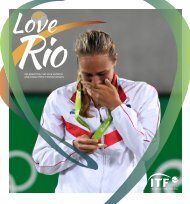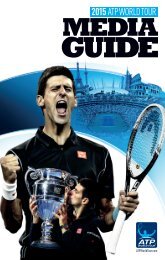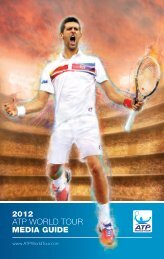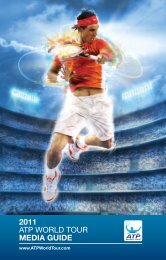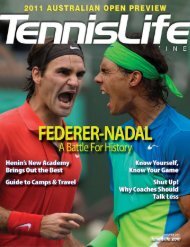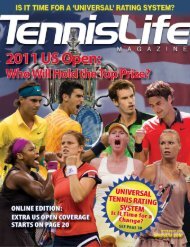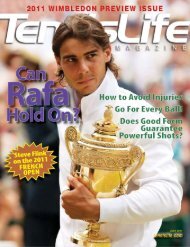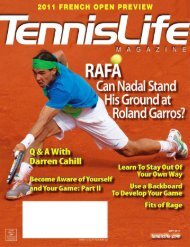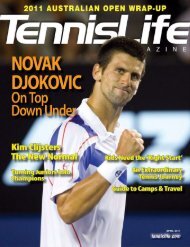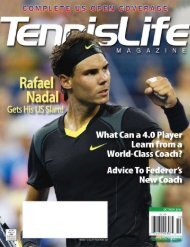A Champion's Mind - Pete Sampras
www.tennismoscow.me Insta:TENNISMOSCOW
www.tennismoscow.me Insta:TENNISMOSCOW
Create successful ePaper yourself
Turn your PDF publications into a flip-book with our unique Google optimized e-Paper software.
was cool. They got along fine, despite the quality and intensity of our rivalry. I remember the very first<br />
time I played Michael, I won in three sets and my dad wasn’t happy that I’d lost one. He wasn’t happy<br />
about that at all. I don’t remember all he said, or exactly how he put it, but I distinctly remember that he<br />
used a word I’ve hated ever since: lousy. He said I played lousy in that set I lost. It’s a tough word. But he<br />
used to say it when I deserved it: “You played lousy.”<br />
After I switched to the one-hander, I started losing to all kind of players, everywhere, including<br />
Michael—and that was the worst. When you’re fourteen, it’s hard to take the long view. The facts were<br />
simple: Michael and I were pretty even; in fact, I probably had a head-to-head advantage in our rivalry—<br />
until I switched to the one-hander. Then he started to hammer me. It was terrible.<br />
What’s worse, Michael was the same age as me, and played his age division, while I “played up.” That<br />
means that when he was playing in the fourteen-and-unders, I was playing in the sixteen-and-unders. And<br />
a lot of people looked down on me for doing that: <strong>Pete</strong>’s doing that because he doesn’t want to deal with<br />
the pressure. He’s playing older kids so he’s not expected to win and he can rationalize losing. He went<br />
to the one-handed backhand, and he’s struggling, so he’s ducking the guys he needs to beat. It’s a copout.<br />
You can argue the playing-up issue either way. There’s a lot to be said for taking on the pressure of<br />
beating the people you’re expected to beat day in, day out. I know, because that’s what I eventually did<br />
during my entire pro career. For me as a junior, though, the dynamic at work was Fischer’s conviction that<br />
I needn’t worry about how I fared against my peers; I had to think long term, and where the game I played<br />
would take me in the long run. Fischer was very stubborn about that, and my dad trusted him.<br />
To us, it was always about playing the right way, trying to develop a game that would hold up<br />
throughout my career. It was a calculated risk. If it didn’t pay off, it would have shown that I was either<br />
not good enough or delusional. On the other hand, some of those juniors were like starving guys, eating<br />
everything on the table while the eating was good. They didn’t think long term, they lived and died by<br />
their daily results, ignoring the fact that what worked in the juniors (like endless soft, arcing rally shots)<br />
wouldn’t necessarily be useful on the pro tour.<br />
There’s another factor in this discussion. The great challenge in junior tennis is avoiding pressure,<br />
because it can be huge, just huge—especially at the nationals level (the most important of the junior<br />
events, open to kids from every different USTA geographic section). By putting pressure on myself to<br />
develop a great game, I had less pressure to win. These days, I tell kids that the way I grew up, it wasn’t<br />
about winning. It was about playing well, about playing the “right” way. That approach helped me enjoy<br />
the game and develop mine to its maximum potential.<br />
As I kept playing through that transition, I saw how much pressure to win some kids had placed on<br />
them, and what it did to their ability to compete. I can honestly say I never felt that pressure, not from my<br />
dad and not from <strong>Pete</strong>. It was never like, “Okay, you have to go out there and win this match.”<br />
Another very valuable side effect of playing up and making a radical change in my technique was that I<br />
learned to lose. A champion is supposed to hate to lose, and it wasn’t like I was ever crazy about the idea.<br />
But I learned to deal with losing without having my spirit or confidence broken, which would help me<br />
immensely over time, not just in the big picture but even in specific matches when I found myself in a jam.<br />
Fear of losing is a terrible thing.<br />
That may explain why I developed a trait that served me well through my entire career, although few<br />
people ever made note of it (probably because it had a lot to do with something I didn’t do, instead of<br />
something I did). I didn’t choke. Not as far as I can ever remember. Don’t get me wrong: I had bad days,<br />
matches in which I froze up because I felt overwhelmed, or in which I never got my game together. There<br />
were days when I lacked determination, and lost. But choking is different. Choking is being in a position<br />
to win, and then experiencing some critical failure of nerve or spirit. That never happened to me. And I<br />
can’t help but think it was because I was never afraid to lose.



